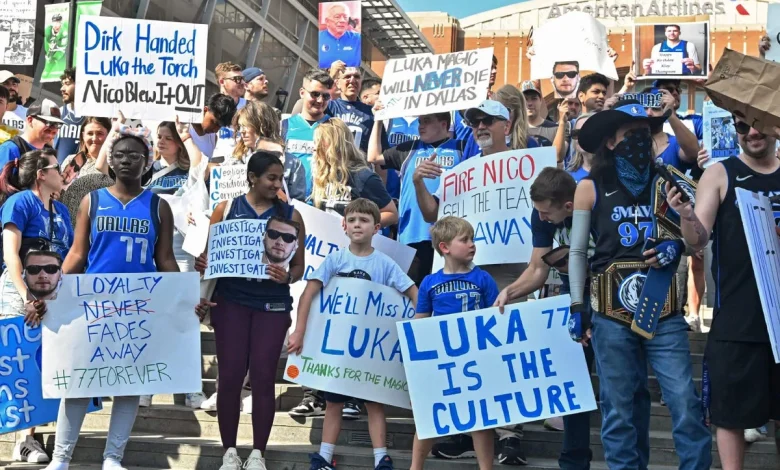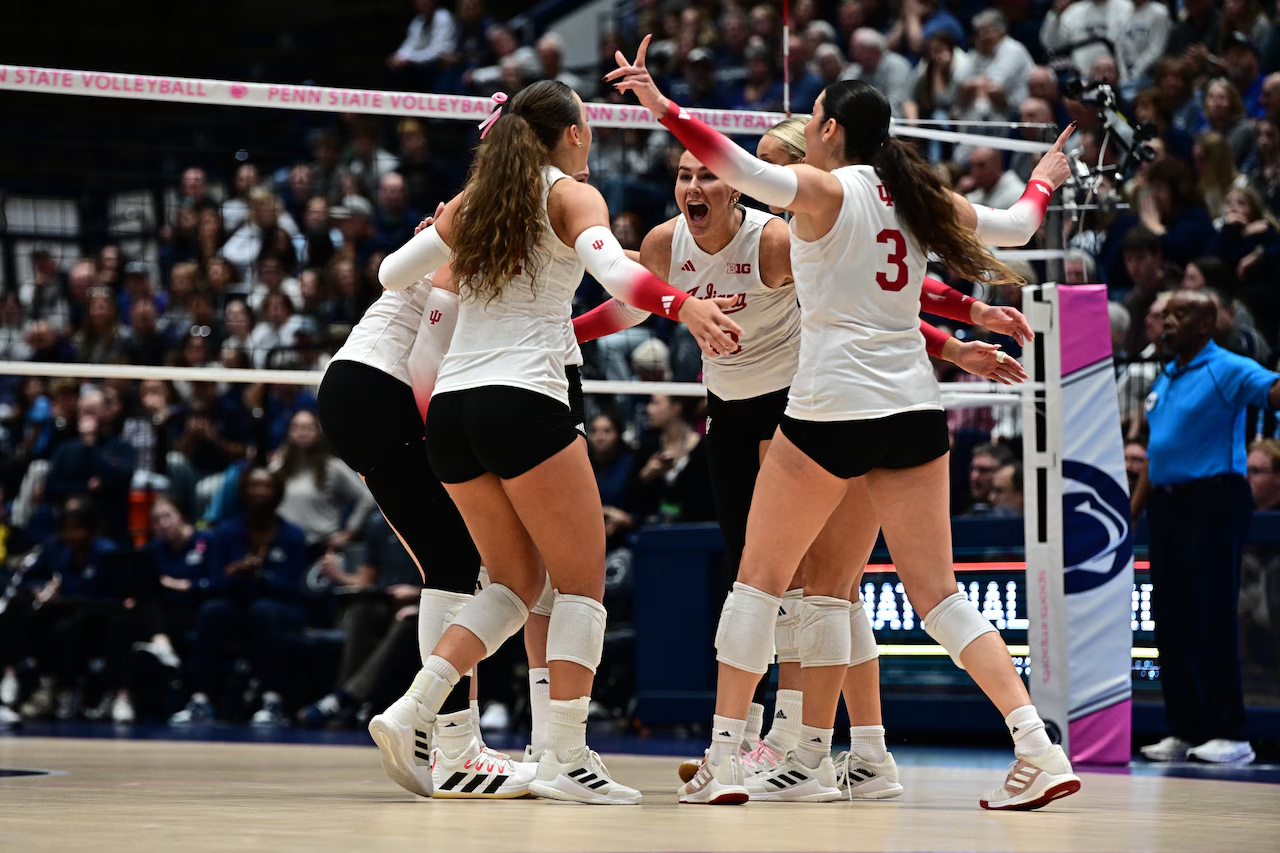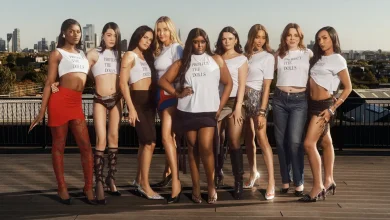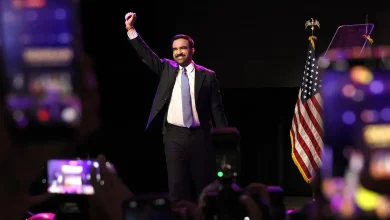The biggest lesson from the Nico Harrison saga? Respect. Your. Fans. – The Athletic

Every professional sports franchise in the four biggest leagues in America is formatted the same way. The location of the team comes first, followed by the nickname.
New York Yankees. Pittsburgh Steelers. Boston Bruins. Dallas Mavericks.
The men in charge of the Mavericks’ decision to trade Luka Dončić to the Los Angeles Lakers last season caused the saga to escalate from a heavily debated transaction to a full-on crisis that tore at the fabric connecting the team to its fans because owner Patrick Dumont and former lead executive Nico Harrison spent far too much time fixated on the “Mavericks” half of the equation. They did not think nearly enough about the “Dallas” part.
There is a reason the city always comes first.
There is no way the Mavericks believed in October that they would be firing Harrison less than a month into this season, and that’s part of the problem.
Harrison was certainly under white-hot scrutiny for trading Dončić for the shockingly modest return of Anthony Davis, Max Christie and one first-round draft pick. But if Mavericks ownership had any designs on moving on from Harrison this quickly, there would have been no reason to start the season with him in charge of the front office.
The Mavericks never expected to start as poorly as they have, sitting at 4-11 after being blown out by the Minnesota Timberwolves on Monday night. But they also never expected the fan base to continue its unrelenting protests of a trade that sent an iconic player to a team they loathe with such fervor.
There is a lesson that organizations in every professional sport can take from this saga, and it rises far above one of the most basic of all tenets: “Thou shalt not trade a franchise icon for pennies on the dollar.” What the Mavs, and anyone else who watched it all unfold beginning with the trade on Feb. 1 up through Harrison’s firing last week, learned is that fans still do have real power and will use it when they are wounded as deeply as Mavs fans were.
Without the protests outside of American Airlines Center, the “Fire Nico!” chants inside or the calls to team headquarters to cancel tickets, Harrison likely would still be working there. Both the general manager and the organization were dismissive of the fan base in the early days of a trade that stunned the entire league like few have before. Most involved severely underestimated the bond that had built between the fans and Dončić and the backlash that would be generated by trading him away.
“I did know that Luka was important to the fan base,” Harrison said last season amid the onslaught of criticism that was coming his way. “I didn’t quite know it to what level.”
That is what escalated the fan revolt in Dallas to levels rarely seen in pro sports. The trade itself was bad enough. Dončić was a 26-year-old with five straight First Team All-NBA honors, two Western Conference finals and an NBA Finals appearance on his résumé. He was shipped out under the cover of darkness for a 32-year-old with a long injury history, a promising young wing and one (1) draft pick, and it appeared that Harrison and Dumont expected the fans to simply accept it and move on.
There was no understanding of the deep ties that bound Dončić to Dallas, no recognition that those fans watched him grow up from a 19-year-old who arrived from Slovenia into a megawatt star who embraced the city, restored the franchise to contender status and played with an emotion and fire that struck right at the heart of a passionate fan base. There seemed to be a minimizing of the core memories that Doncic instilled in the fan base during stirring playoff runs. The only way he could have been bigger or more beloved in Dallas was if he quarterbacked the Cowboys to the Super Bowl.
So how could Harrison not know how important he was? How could Dumont try to justify the trade by saying the Mavericks wanted players who “worked hard, every day” and then cite Shaquille O’Neal as an example and not franchise icon Dirk Nowitzki?
Harrison seemed to believe that simply saying “defense wins championships” over and over again would soothe the frayed nerves, like Dorothy repeating “There’s no place like home.” Both of them operated as if the fans who are the life blood of a franchise were mere underlings in some nameless, money-making corporation who dutifully clock in every day because they have no other choice, not because Dončić united them and represented them in a way that made them proud to be from Dallas.
“My obligation is to the Dallas Mavericks, it’s what’s in the best interest of the Dallas Mavericks, and that’s the most important thing,” Harrison said last April. “Some of those decisions are going to be unpopular, maybe to Dirk and maybe to the fans, but my obligation is to the Dallas Mavericks.”
Harrison’s tone was drenched in the arrogance of an all-knowing basketball executive operating on a higher intellectual plane than the knuckle-dragging fans in No. 77 jerseys sitting in the upper deck of the AAC.
The lack of recognition and connection was illustrated in the days after the trade. It began the next day with a hastily assembled news conference in Cleveland, where the Mavericks were in town to play the Cavaliers, in which Harrison took questions for all of nine minutes on one of the biggest decisions in franchise history. He made several awkward jokes that landed poorly with the fan base and gave the impression that he was not taking the five-alarm fire that the move created back home seriously enough.
It would be 72 days before Harrison would take questions about the trade again, leaving coach Jason Kidd and the players to deal most directly with the fallout, including an injury in his very first game in a Mavericks uniform that caused him to miss the next 16 contests and Dončić’s emotional first game back in Dallas last April.
Dumont seemed legitimately surprised when he was booed while taking his seat courtside at American Airlines Center after the deal, as if fans should have already accepted the trade and moved on by then.
Even CEO Rick Welts, one of the most experienced and respected business executives in the NBA, tried to do damage control by telling the stories of previous fan angst he’d experienced at other stops, offering the Phoenix Suns trading Stephon Marbury and the Golden State Warriors trading Monta Ellis as examples. Neither the Suns nor the Warriors were coming off a trip to the NBA Finals at the time they made those trades. Neither Ellis nor Marbury was in the same universe as Dončić when it came to talent and popularity in their respective cities.
And of course the Mavericks went ahead with ticket price increases for this season as well.
Even a summer to blow off steam and the incredibly fortuitous draft lottery luck that allowed the Mavericks to land No. 1 pick Cooper Flagg were not enough to dull the fan vitriol toward the organization. Dončić got off to an incredible start to the season with the Lakers. Davis has played in just five games because of injury and won’t be back for at least another week, and so fans continued to pelt Harrison with “Fire Nico!” chants at the AAC. They made it clear that they weren’t just going to let this go. They were not just angry. They were insulted.
Finally, last week, it became too much for the organization to endure. Flagg’s mother expressed frustration with hearing the chants while Mavs players were shooting free throws. Flagg himself lamented all the losing that he has already experienced as a pro. The Mavericks had to do something.
“These guys, they can hear those things,” Kidd said after Harrison was fired. “And they feel really disrespected. It’s hard to keep guys here when they start to think the home team is not home, and it becomes a visiting place. Hopefully, that changes tonight.”
Harrison was fired and Dumont penned an apology to Mavs fans, a small gesture to try to start the healing process.
Harrison had earned respect across the league for how he operated when he was an executive with Nike and made some savvy moves to assemble the team that made the finals in 2024. But he just never seemed to grasp that Dončić and the Mavericks are so much more than just one player and one team to the fans who invest in them.
Even after he was fired, he quickly changed the bio on his Instagram profile to read “Unemployed.” It is a factual statement, but it seems to have been made with a smirk, as if the fans will not carry the scars of this trade with them for as long as they live.
Unsurprisingly, it was Nowitzki who seemed to see things clearer than either Dumont or Harrison ever could. Nowitzki played in Dallas for 21 years, winning a championship and an MVP. He has a statue outside the arena and an unbreakable connection with the fan base.
While appearing on Amazon Prime, Nowitzki said Harrison should have been fired this summer.
“I figured this fan base is a passionate and loyal fan base. I was lucky enough to experience it for 21 years. And I knew they weren’t (going to) just get over it, as people say, or forget about it,” Nowitzki said. “They’re extremely passionate. And this trade just made no sense. It made no sense to (the fans). And, really, there was no explanation for it, either.”





